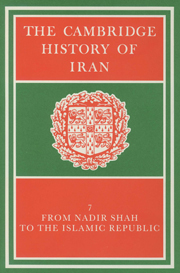Book contents
- Frontmatter
- PART 1 THE POLITICAL FRAMEWORK, 1722–1979
- PART 2 FOREIGN RELATIONS
- 8 IRANIAN RELATIONS WITH THE OTTOMAN EMPIRE IN THE EIGHTEENTH AND NINETEENTH CENTURIES
- 9 IRANIAN RELATIONS WITH RUSSIA AND THE SOVIET UNION, TO 1921
- 10 IRANIAN RELATIONS WITH THE EUROPEAN TRADING COMPANIES, TO 1798
- 11 IRANIAN RELATIONS WITH GREAT BRITAIN AND BRITISH INDIA, 1798–1921
- 12 IRANIAN FOREIGN POLICY, 1921–1979
- PART 3 ECONOMIC AND SOCIAL DEVELOPMENTS
- PART 4 RELIGIOUS AND CULTURAL LIFE, 1721–1979
- Genealogical tables
- Bibliographies
- Index
- References
12 - IRANIAN FOREIGN POLICY, 1921–1979
from PART 2 - FOREIGN RELATIONS
Published online by Cambridge University Press: 28 March 2008
- Frontmatter
- PART 1 THE POLITICAL FRAMEWORK, 1722–1979
- PART 2 FOREIGN RELATIONS
- 8 IRANIAN RELATIONS WITH THE OTTOMAN EMPIRE IN THE EIGHTEENTH AND NINETEENTH CENTURIES
- 9 IRANIAN RELATIONS WITH RUSSIA AND THE SOVIET UNION, TO 1921
- 10 IRANIAN RELATIONS WITH THE EUROPEAN TRADING COMPANIES, TO 1798
- 11 IRANIAN RELATIONS WITH GREAT BRITAIN AND BRITISH INDIA, 1798–1921
- 12 IRANIAN FOREIGN POLICY, 1921–1979
- PART 3 ECONOMIC AND SOCIAL DEVELOPMENTS
- PART 4 RELIGIOUS AND CULTURAL LIFE, 1721–1979
- Genealogical tables
- Bibliographies
- Index
- References
Summary
In recent times, a significant aspect of Iran's foreign relations has been foreign interference in the country's affairs, with varying Iranian response to this. Three major factors have played a determining role in this: Iran's growing strategic and economic importance as an oil producer in a zone of major power rivalry; the national features of Iran as a predominantly Shī‘ī, but socially heterogeneous society, with no consensus over the appropriate form and functions of government; and the need of the rulers of Iran to ensure the continuation of their rule and to govern Iran effectively in these circumstances. Iran's foreign relations between 1921 and 1979 must be studied in this context. This period covers the rule of the Pahlavī dynasty, begun by Rizā Shāh's accession to the throne in 1925, following his seizure of political power through a coup in 1921, and ended with the overthrow of his son, Muhammad Rizā Shāh, in 1979. The collapse of the Pahlavī dynasty opened the way for its major opponent, Āyatullāh Rūh-Allāh Khumainī, to declare Iran an Islamic Republic and abolish the monarchy.
For historical and analytical purposes, the Pahlavī period is best examined in three parts: Rizā Shāh's rule (1925–1941), Muhammad Rizā Shāh's reign (1941–53) and his rule (1953–1979). During each of these periods, foreign powers subjected Iran to different types of pressure and encroachment, influencing the country's domestic and foreign policies in distinct ways. Under Rizā Shāh, while Anglo-Russian rivalry over Iran was kept in abeyance as the two powers' changing interests dictated, Iran's foreign policy reflected various short-term attempts to maintain this situation and benefit from it in the assertion of Iran's independence.
- Type
- Chapter
- Information
- The Cambridge History of Iran , pp. 426 - 456Publisher: Cambridge University PressPrint publication year: 1991
References
- 5
- Cited by

